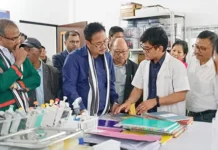[ Prafulla Kaman ]
PASIGHAT, Aug 14: Although cases of malaria and Japanese Encephalitis (JE) have not been reported in East Siang in the last two years, the district health department is not staying relaxed. It has taken all necessary steps and measures to prevent recurrence of the two vector-borne diseases.
“We have already conducted several awareness meetings to generate public awareness about the diseases, their causes, and preventive measures,” said District Medical Officer (DMO) Dr Mandip Perme.
While the source reduction drive will be continued, the doctors have been alerted to keep tight vigil on any cases of dengue, Dr Perme said. He said the department is giving more focus on reduction of mosquito breeding sources as primary preventive measure and mobilizing people to destroy the breeding sources.
The source reduction drive was initially carried out within Pasighat urban area, but was gradually extended to all rural areas of Ruksin, Nari, Korang and Mebo blocks, said the DMO.
He advised the people to treat stagnant water with medicines (Temephose) to kill mosquito larvae, and conduct source reduction activities in their localities frequently, stating that fogging is not effective enough to kill mosquito larvae that survive in muddy water.
He appealed to all, including urban and rural bodies and community members, to make coordinated efforts to prevent the diseases.
Dengue was first reported in the district in 2012, and around 223 people had suffered from dengue fever. After a year’s pause, the disease broke out again in 2014, and 27 dengue positive cases were reported in the district.
The disease again broke out in epidemic form the next year (2015), creating panic among the people. In that year, 1725 people were tested positive for dengue.
The number of dengue case had declined to 10 in 2016 due to massive fogging and source reduction operation carried out by the health department.
According to Dr Perme, malaria cases have also fallen significantly in the district.


